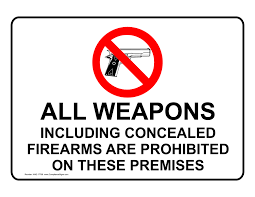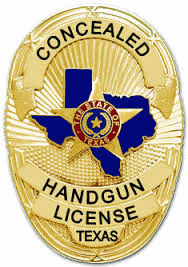Can security guards legally carry firearms off duty?

Security guards often travel to and from work in gear – some armed, while others unarmed. Is it legal for security officers to carry guns into locations they are not assigned to? If not on post, can security guards legally carry firearms off duty?
This is a very hot topic with security and law enforcement right now as the industry expands and guards are being seen many places armed. Some question if this is a violation or not… well, here’s the answer to this once and for all.
Texas Certified Training Academy has received several phone calls monthly pertaining to the topic at hand along with a few emails from security companies and law enforcement all inquiring about what we are teaching, what the regulations state, and what our understanding of the” Letter and the Spirit” of this law is.
Many have checked with DPS and were referred to the Texas Penal Code section 46.02 & 46.03 or were given different answers depending on who answered the phone at DPS.
Security guards carrying firearms off duty – Do guard companies allow this?
The issue: Security officers are seen eating at restaurants, shopping at local grocery stores, and standing in line for personal reasons such as paying bills, but all in uniform and fully armed. None of the places mentioned were contracted locations their company was providing services for.
Because the state has licensed them, their firearm is exposed, and they are in uniform, the guards should be “good to go” anywhere they please.
Some guards say “I don’t want to leave an unsecured firearm in my vehicle while I go inside to shop;” others will state, “they changed the law and now we can do it” – but they don’t know the penal code number and cannot recite word for word what it even says.
Some know a piece of it and will tell you that in 2007 a Texas House Bill was passed which changed the wording of TPC 46.03 and they took out the word “Directly” and specifically gave security mention and permission; this is where the misunderstanding comes in and the problem begins.
This all starts from officers not being properly trained by other schools and not being properly informed by their companies.
Security training for armed and unarmed guards
We have to study the two laws that cover this area to understand what is right or wrong here:
Sec. 46.02. UNLAWFUL CARRYING WEAPONS.
(a) A person commits an offense if the person intentionally, knowingly, or recklessly carries on or about his or her person a handgun, illegal knife, or club if the person is not:
(1) on the person’s own premises or premises under the person’s control; or
(2) inside of or directly en route to a motor vehicle that is owned by the person or under the person’s control.
an offense under this section is a Class A misdemeanor.
Continued from 46.02: (c) An offense under this section is a felony of the third degree if the offense is committed on any premises licensed or issued a permit by this state for the sale of alcoholic beverages.
Sec. 46.03. PLACES WEAPONS PROHIBITED. 
(a) A person commits an offense if the person intentionally, knowingly, or recklessly possesses or goes with a firearm, illegal knife, club, or prohibited weapon listed in Section 46.05(a):
(1) on the physical premises of a school or educational institution, any grounds or building on which an activity sponsored by a school or educational institution is being conducted, or a passenger transportation vehicle of a school or educational institution, whether the school or educational institution is public or private, unless pursuant to written regulations or written authorization of the institution; (2) Polling place (3) Any government court or offices utilized by the court, unless pursuant to written regulations or written authorization of the court; (4) On the premises of a racetrack; (5) In or into a secured area of an airport;
(d) It is a defense to prosecution under Subsection (a)(5) that the actor possessed a firearm or club while traveling to or from the actor’s place of assignment or in the actual discharge of duties as:
(1) A member of the armed forces or National Guard;
(2) A guard employed by a penal institution; or
(3) A security officer commissioned by the Texas Private Security Board if:
(A) The actor is wearing a distinctive uniform; and
(B) The firearm or club is in plain view; or
(h) It is a defense to prosecution under Subsection (a)(4) that the actor possessed a firearm or club while traveling to or from the actor’s place of assignment or in the actual discharge of duties as a security officer commissioned by the Texas Board of Private Investigators and Private Security Agencies, if:
(1) The actor is wearing a distinctive uniform; and
(2) The firearm or club is in plain view.
(i) It is an exception to the application of Subsection (a)(6) that the actor possessed a firearm or club:
(1) While in a vehicle being driven on a public road; or
(2) At the actor’s residence or place of employment.
Is it against the law for off-duty security to carry guns?
Although everyone points to TPC 46.03, this talks about prohibited areas such as churches, schools, polling places, courts, government offices, racetracks, etc. – places you are not allowed to be or around with your firearm.
This same section gives permission for security officers to be in those stated locations only if they fit the stated criteria. This only allows exemptions to the prohibited areas if you are assigned there or traveling to and from the actor’s place of assignment (work site).
This permits you to travel through a school zone armed if you’re on your way to work, or you may legally work at a courthouse or other location armed if you fit the criteria. This is not a green pass to travel all over your town and go shopping , wash your car, and sit down and eat meals at restaurants armed; you are NO LONGER TRAVELING and the protection from the exemption no longer applies.
So the two things in that section that guards incorrectly use is (1) Place of assignment, and (2) Traveling.
If your security company does not have a contract at Walmart, HEB, or at your local restaurant, then those locations are NOT your place of assignment. If you are not in “travel mode” and you stop and go shopping, you are not protected by this law (period!)
Section 42.02 states you commit an offense if you are carrying a handgun or club (baton) on a property that is not yours or that you are not in control of – or that you are not in a vehicle or in route to or from a vehicle. This 100% shuts the door completely on the guards doing this without any spirit or letter of the law here.
Another big issue no one has brought up is the insurance issue. As an armed security officer, your company carries liability insurance for your actions and that firearm; however, your company’s insurance policy only covers your actions on your client’s property…
So basically, security officers are uninsured when they do this, to include breaking the law.
 The laws are very clear and we recommend if you have to go inside a store or restaurant either take your gun belt off or get a CHL and conceal your weapon… or don’t make that stop. Some have argued that they have entered private property and only the place of business can ask them to leave – WRONG!
The laws are very clear and we recommend if you have to go inside a store or restaurant either take your gun belt off or get a CHL and conceal your weapon… or don’t make that stop. Some have argued that they have entered private property and only the place of business can ask them to leave – WRONG!
The place of business protects you from Trespassing (in our example), as you are welcome to be there but the place of business cannot give you permission to break a state law regarding unlawful carrying of a firearm.
 Lastly, a CHL cannot be combined with any security regulated work, so if using this avenue to carry then you would have to be out of uniform. With Texas’ open carry law taking place January 1, 2015, this also will not apply to licensed and uniform security officers.
Lastly, a CHL cannot be combined with any security regulated work, so if using this avenue to carry then you would have to be out of uniform. With Texas’ open carry law taking place January 1, 2015, this also will not apply to licensed and uniform security officers.
For more info on this topic, contact Texas Certified Training Academy.

